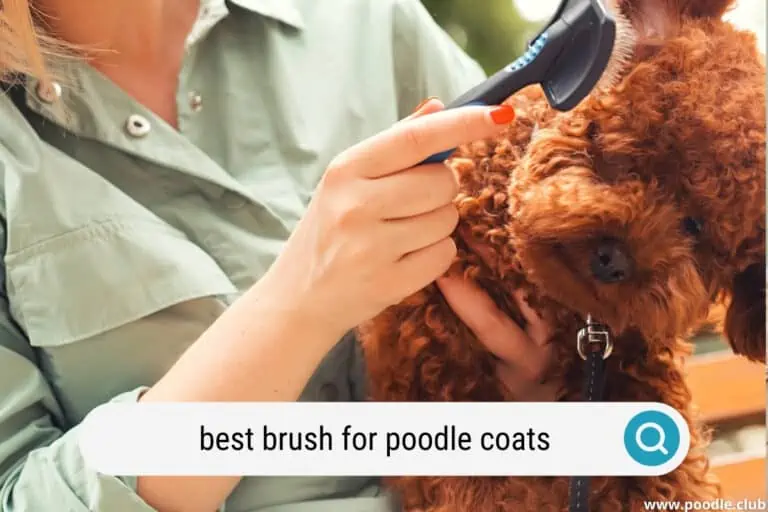Are Miniature Poodles Aggressive? [Myths]
Miniature Poodles are typically not an aggressive breed. They are known for their friendly and intelligent nature, though behavior can vary between individuals.

Generally, Miniature Poodles are tolerant, social, and not naturally aggressive. But, like all breeds, their behavior can depend on factors like upbringing, training, and environment. Proper socialization and training are key to encouraging a well-behaved and sociable pet. Keep in mind that each dog is unique, so understanding and addressing individual needs are crucial.
A study found that Miniature Poodles had lower levels of dog-directed aggression compared to Golden Retrievers and Standard Poodles, suggesting that they may be less prone to aggressiveness overall source. Keep in mind that proper socialization and training from a young age are crucial in ensuring that your Miniature Poodle develops into a well-behaved and friendly companion.
Understanding Miniature Poodles
Temperament
Miniature Poodles are known for their friendly and affectionate nature. They are typically sociable, adaptable, and quickly bond with their families. While their lovable demeanor makes them excellent companions, they are not inherently aggressive dogs. However, like any breed, they may display dog-directed aggression in certain situations or if not properly trained and socialized from a young age.
Intelligence
It’s no secret that Poodles are among the smartest dog breeds, and Miniature Poodles are no exception! Their intelligence makes them highly trainable, as they can quickly grasp new concepts and commands. It’s said that Miniature Poodles can even outwit their owners sometimes, which adds a touch of humor to their daily interactions.
Size
As their name suggests, Miniature Poodles are smaller than their Standard Poodle counterparts, typically weighing between 10 to 15 pounds and standing around 11 to 15 inches at the shoulder. Despite their smaller stature, these dogs are sturdy and athletic, making them well-suited for various activities, from agility courses to brisk walks in the park.
PuppySpot is a reputable dog marketplace where you can browse and find compatible puppies right from the comfort of your home. They have placed over 200,000 puppies into homes in the US!
Lifestyle
Miniature Poodles are adaptable and can thrive in various living situations, be it a spacious house or a small city apartment. Being highly energetic dogs, they do require daily exercise and mental stimulation to stay happy and healthy. Their hypoallergenic, low-shedding coat is a significant advantage for allergy sufferers, though regular grooming is necessary to prevent matting. Keep in mind, Miniature Poodles are also registered with the American Kennel Club, ensuring reliable information about the breed’s standards and characteristics.
In conclusion, Miniature Poodles are intelligent, friendly, and highly adaptable dogs, making them excellent companions for a variety of lifestyles. With proper training, socialization, and grooming, these dogs can offer endless love and laughter to those around them.
Aggressive Behavior in Miniature Poodles
Causes of Aggression
Miniature Poodles are generally known for their intelligence and friendly nature. However, like any breed, they may exhibit aggressive behaviors due to various factors. For instance, genetics could play a role, with some studies suggesting Miniature Poodle crosses are more prone to dog-directed aggression and fear. Additionally, health problems or anxiety can contribute to aggression in these pint-sized pooches.
Another main cause of aggression in Miniature Poodles is lack of socialization. If they’re not exposed to different environments, people, or animals early in life, they may become fearful or anxious, which can escalate to aggression. This highlights the importance of proper socialization for your curly-haired companion.
Common Signs
Recognizing the signs of aggression in your Miniature Poodle can help in preventing and managing problematic behaviors. Watch out for:
- Barking: Loud, continuous barking at strangers or other animals might indicate aggression
- Growling and snarling: Low, guttural growls or bared teeth serve as warnings
- Lunging: Suddenly approaching other dogs or people with an aggressive stance
- Biting or nipping: These behaviors are particularly important to address, as they can escalate in severity
Preventing and Managing Aggression
Prevention is always better than cure, as the saying goes. Here are some steps to prevent and manage aggressive behavior in your Miniature Poodle:
- Early socialization: Expose your pup to various environments, people, and animals from a young age
- Training: Teach your Miniature Poodle basic obedience commands, like “sit” and “stay”
- Redirecting: If your dog displays aggression, redirect their energy to a more positive activity, such as a game or a treat
But let’s face it: No pooch is perfect! If your Miniature Poodle does exhibit aggressive behavior, it’s important to address the issue right away. Consult with a professional dog trainer or behaviorist who can provide guidance on managing and modifying your dog’s behaviors.
So, while Miniature Poodles might resemble tiny, adorable balls of fluff, it’s crucial to remember they have their quirks, too! Proper training, socialization, and care will help ensure your poodle pal remains a well-behaved and lovable companion.
Socialization and Training
Importance of Socialization
Miniature poodles are generally known for their friendly and charming nature. However, like any breed, they can show signs of aggression if not properly socialized from an early age. Socialization is crucial in shaping the personality, behavior, and temperament of a dog. A well-socialized miniature poodle can be an excellent companion for children, enjoying the company of humans and other pets alike.
Anecdote time! Picture a cute, fluffy poodle making friends at a dog park, its charm and grace mesmerizing everyone around. That’s the result of proper socialization.
Puppy Socialization
Puppyhood is the prime time to introduce your miniature poodle to various situations, people, and animals. Ensuring that your poodle puppy is exposed to a variety of positive experiences will create a strong foundation for a well-behaved adult dog. Here are a few tips to successfully socialize your puppy:
- Gradually expose them to new people, places, and experiences
- Create positive associations with children, visitors, and other animals
- Allow them to safely explore their environment at a comfortable pace
- Attend puppy socialization classes to maximize exposure and learning
Remember, patience is a virtue, especially when it comes to training a ball of fur and cuteness.
Training Techniques
When dealing with a miniature poodle, using positive reinforcement techniques to correct aggressive behavior is key. They respond well to praise, treats, and regular exercise, ensuring a loyal and well-adjusted companion. Some techniques that can be used to address aggression in poodles include:
- Establishing clear boundaries for personal space
- Encouraging polite greetings with guests using praise and rewards
- Providing a designated “safe space” within the home for your poodle to relax
- Consistent discipline to enforce desired behaviors and reduce anxiety
As the saying goes: “train a poodle, and you’ll have a lifelong elegant companion.” Or something like that!
By devoting the necessary time to socialization and applying appropriate training techniques, a miniature poodle can become the perfect well-behaved, loyal, and loving companion we all know they can be. Just remember, it might take some patience and the occasional poodle-sized dog biscuit.
Dealing with Aggressive Miniature Poodles
Seeking Professional Help
If your Miniature Poodle is exhibiting signs of aggression such as excessive barking, growling or even biting, seeking professional help is essential. A qualified professional dog trainer or behaviorist can assess the mental and physical factors contributing to your dog’s aggression and recommend appropriate training methods. Remember that each dog is unique, and strategies that work for one may not necessarily suit another.
Anxiety may be a reason behind your Miniature Poodle’s aggression, as shown by a study where Miniature Poodles were found among breeds displaying aggressive behavior. Hence, you should keep your dog’s anxiety in mind when consulting a professional.
Medical Treatments
Sometimes, an underlying medical issue might be the cause of your Miniature Poodle’s aggressive behavior. It’s essential to consult with a veterinarian to determine if there’s a physical factor involved. They might recommend medical treatment, such as medication or therapy, to alleviate the aggression. Don’t rely on self-diagnosis — let the experts handle it.
Safety Precautions
While you’re addressing your Miniature Poodle’s aggressive behavior, prioritizing safety should be a top concern. Here are some tips for ensuring everyone’s wellbeing:
- Leash: Keep your dog on a leash at all times when outside to prevent them from potentially attacking another dog or innocent bystander.
- Crate: Invest in a crate if you have guests or children visiting, as it can help restrain the dog and protect both visitors and your pet.
- Communication: Inform people in advance that your dog might be aggressive and provide clear instructions on how to interact with your dog safely.
Remember, even if your Miniature Poodle is small, it can still cause harm to both adults and children. It’s better to be safe than risk any dangerous situations or dog bites.
In the end, dealing with an aggressive Miniature Poodle may not be a walk in the park, but with patience, professional help, and safety precautions, you can improve your dog’s behavior and bring back the delightful companion you know and love. Remember, we’re all just trying to live our best “paw-sible” lives!
Miniature Poodles as Family Pets
Miniature Poodles are often considered great family pets due to their friendly temperament, high-energy levels, and adorable appearance. While they can be reserved with strangers, they’re generally accepting and friendly with their human families, making them excellent companions for both children and adults.
Adopting from Animal Shelters
When considering adding a Miniature Poodle to your family, adopting from an animal shelter is an excellent option. This not only gives a loving home to a dog in need but also allows you to observe their behavior and temperament more accurately than when selecting a puppy. It’s like picking the perfect roommate at a party – you already know if they’ll dance on the table or quietly enjoy the snacks in the corner.
Finding Reputable Breeders
If you decide to purchase from a breeder, make sure you find a reputable breeder who focuses on the health and happiness of their dogs. A good breeder can help guide you to a puppy that matches both your lifestyle and desired temperament. Remember, finding the right breeder is like finding a good hairstylist – the right one can make all the difference in the final result.
Caring for Miniature Poodles
Miniature Poodles require proper care and attention to ensure a happy, healthy life. Here are some key points to keep in mind:
- Exercise: Miniature Poodles have high energy levels, so daily physical activity is a must. Think of them like a toddler with a sugar rush – they need to release that energy somewhere, so better a walk than your living room furniture!
- Grooming: Their curly coats require regular brushing and professional grooming, unless you want your dog to resemble a walking cotton ball.
- Socialization: Early socialization with other animals and humans will help them feel more comfortable and friendly. Picture them as the friendliest guest at a cocktail party, mingling and schmoozing with the crowd.
- Training: Although they’re intelligent and eager to please, their energy levels may make them a bit scattered. Consistent and positive training methods will shape them into the perfect companion, just like a sculptor chiseling away at a beautiful marble statue (but with treats!).
By considering these factors and understanding the temperament and needs of Miniature Poodles, you can provide a loving and enjoyable home for your new family pet. And hey, who wouldn’t love a dog that looks like it’s wearing a fluffy pair of pants?


![Are Poodles Retrievers [Breed Trait]](https://poodle.club/wp-content/uploads/2023/05/are-poodles-retrievers-768x512.webp)

![When Do Toy Poodles Stop Growing [Key Milestones]](https://poodle.club/wp-content/uploads/2023/05/when-do-you-poodles-stop-growing-768x512.webp)
![Toy Poodle vs Yorkie [with Photos]](https://poodle.club/wp-content/uploads/2022/12/toy-poodle-vs-yorkie-768x512.webp)

![Are Poodles Anxious? [7 Causes]](https://poodle.club/wp-content/uploads/2023/05/are-poodles-anxious-768x512.webp)